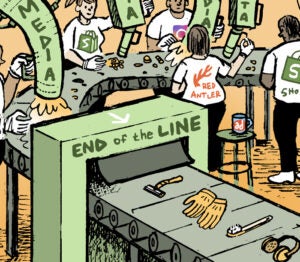 This story is part of a series on publisher coalitions and co-ops around the world. Read our earlier pieces on Pangaea and the Association of Online Publishers in the UK, La Place Media in France, SouthernX in Africa and Project Agora in Greece and Romania.
This story is part of a series on publisher coalitions and co-ops around the world. Read our earlier pieces on Pangaea and the Association of Online Publishers in the UK, La Place Media in France, SouthernX in Africa and Project Agora in Greece and Romania.
Australian media giants Fairfax and Nine Entertainment Co. wanted to create a coalition with truly unique inventory.
Since both publishers had already delved into private marketplaces for desktop ads, they combined inventory to form Apex, a mobile exchange.
“Because there was no mobile programmatic market in Australia, we could immediately capitalize on the market,” said Apex CEO Pippa Leary, who for now is Apex’s sole employee.
Another reason to focus on the channel: “Mobile suffers in Australia from not receiving any brand money,” Leary said. “It’s oversupplied and commoditized. No one is interested in creating a hero brand format in mobile, and no one publisher is big enough to change the market.
Apex, first revealed in November, has six weeks left in its beta testing. One of the main things it’s testing is categorization. It decided to group inventory by buy-side verticals, like travel, retail, financial services and automotive, rather than content verticals, and is testing whether that was the right choice.
Publishers will eventually commit to putting 90% of unreserved mobile inventory in exchanges. Eventually, desktop, video and native formats may follow.
Apex hopes to officially launch before June 30. The journey to get online will be far shorter than the journey to get all publishers on board, which took two years.
Australia’s media market is extremely consolidated, with just four major players: Nine Entertainment Co., Fairfax, News Corp. and Yahoo.
“Having such a consolidated market was good and bad,” Leary reflected. “It’s easy for the four of us to sit in a room together, but because the competitive nature of their relationship is so deep, even if you get one set of senior executives across the line, if those change, you have to convince a whole new set again.
That’s exactly what happened. First Yahoo dropped out of the talks. Then a new CEO at News Corp. meant the publisher pulled out before joining the coalition.
AdExchanger Daily
Get our editors’ roundup delivered to your inbox every weekday.
Daily Roundup
But Leary thinks that as long as all Australian premium publishers eventually join a coalition, even if it’s not Apex, they’ll be in good shape. For instance, France has two competing consortiums, La Place and Audience Square, which has inspired many publishers to move their premium inventory move off Google AdX and into the two exchanges.
“The programmatic market in France has stepped up because between the two of them it creates a market,” Leary said.
She is watching closely to see how publisher coalitions fare across the globe. The key to long-term success will be to create a “two-speed economy, where there is a difference between professional content and amateur, long-tail content,” Leary said. “The only way they’re going to do that is by removing their inventory from open exchanges, and getting over competition with longtime competitors.”
Unlike many other publisher coalitions, where the publishers can work together to discuss pricing, Australia has extremely strict rules that prevent such arrangements because of regulations about price fixing, anti-competitive behavior and third line forcing.
To comply with regulators, each publisher has an individual relationship with AppNexus, which powers the consortium. Consequently, discussions about setting price floors occur with the ad tech vendor, and not within Apex.













